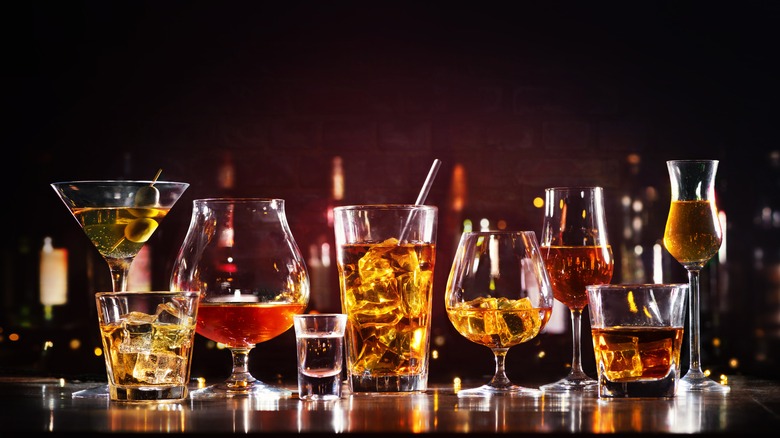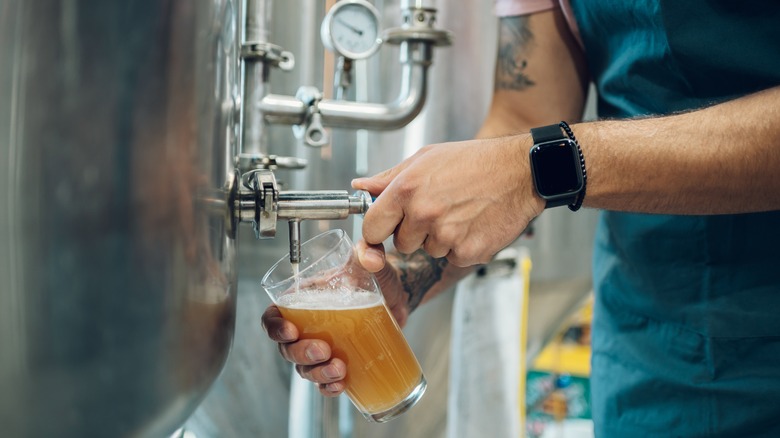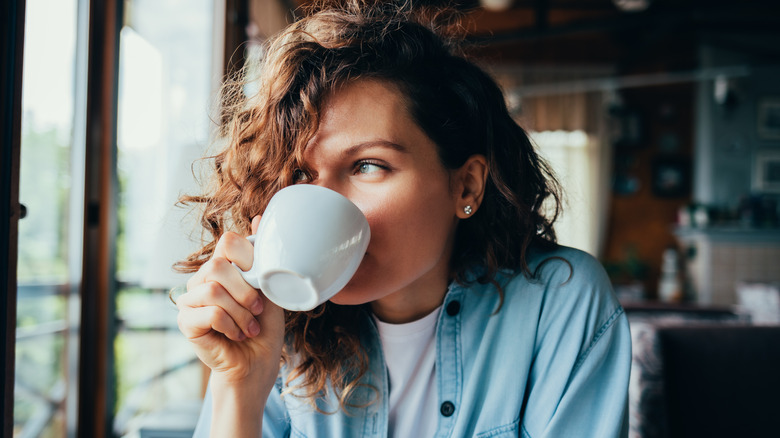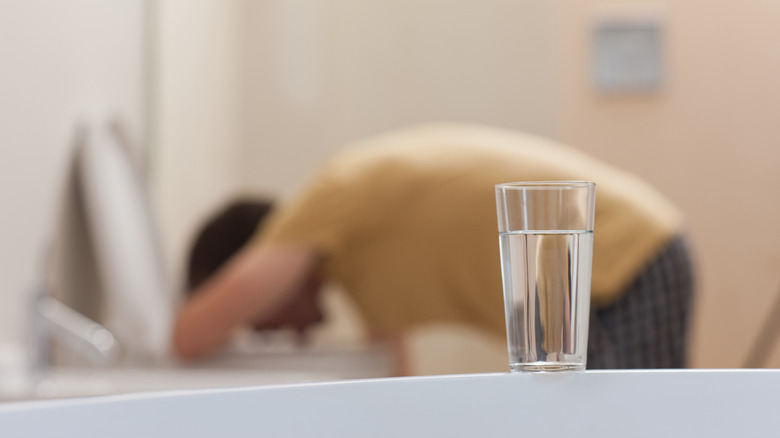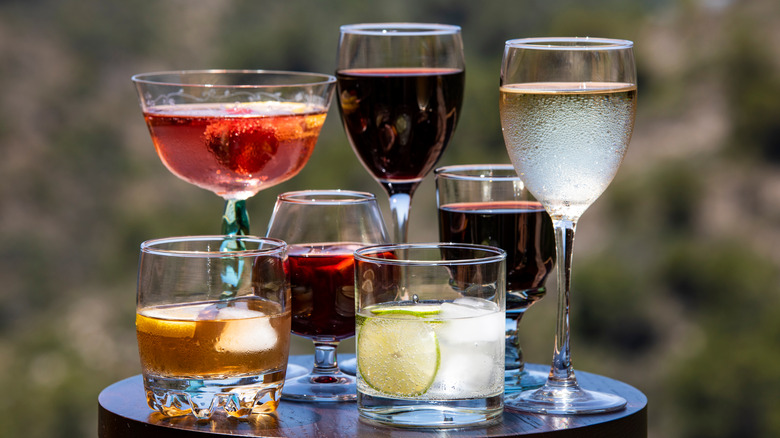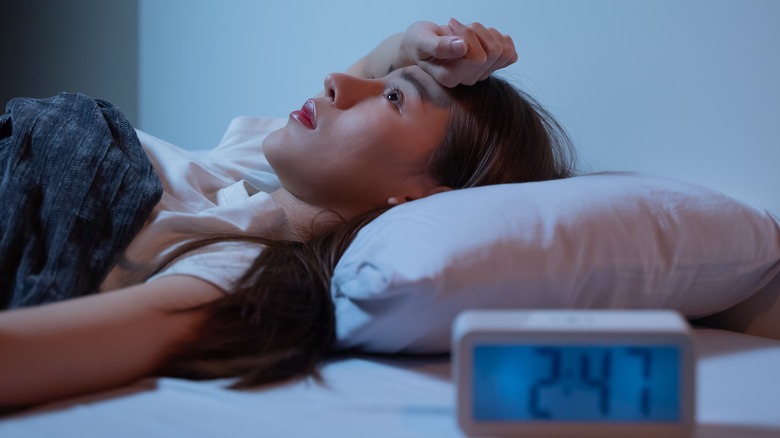Alcohol Myths You Should Stop Believing
Just about everyone has their own little stash of tricks for navigating the effects of alcohol consumption, whether it be sobering up in a blink of an eye or dodging the dreaded hangover. While some tactics, such as drinking water, may hold some merit, others will leave you no better off or even end up exacerbating the situation.
Whether you enjoy an occasional libation, indulge in a regular nightcap, or take things to the extreme, there's no shortage of remedies out there that purport to help you along the way. Some strategies, like drinking a cup of coffee to sober up, are well-known among barflies, while others are more obscure and unique to each individual. And since many are based on fiction rather than science, it pays to tread carefully. What may initially seem like a genius move to mitigate the effects of your night out could end up being a misstep that makes everything worse.
Ready to bust some alcohol myths? We're here to help you separate fact from fiction.
Drinking in moderation has health benefits
While the idea that a glass of wine a day is good for you is certainly comforting, it actually holds very little basis in reality. Some studies suggest that moderate alcohol consumption of up to two standard drinks per day has some health benefits, but things may not be quite so simple. According to Tim Stockwell, the former director of the Canadian Institute for Substance Use Research at the University of Victoria in British Columbia, many studies that link moderate alcohol consumption with health benefits are flawed (via U.S. News).
After conducting a comprehensive analysis of more than 100 studies and carefully accounting for group biases, Stockwell discovered that individuals consuming alcohol in the range of 25 grams to 44 grams (around two or three drinks) per day had a slightly higher risk of death. Furthermore, the risk of death significantly escalated among individuals consuming alcohol beyond that amount.
A 2022 World Heart Federation report found that moderate alcohol consumption has no positive effect on the heart. In fact, the policy brief draws a link between alcohol and conditions such as coronary disease, stroke, cardiomyopathy, and even heart failure. The study also highlights that previous research indicating a positive correlation between moderate drinking and health failed to consider other crucial lifestyle factors among participants, such as pre-existing health conditions.
If you have one drink an hour, you'll stay sober enough to drive
Driving with a blood alcohol concentration above 0.08% is illegal. The rules are even stricter for those under 21. In order to avoid DUIs, many individuals swear by the "one drink per hour rule," which says that as long as a person consumes no more than one standard drink an hour, they will stay sober enough to drive.
To avoid unpleasant situations or worse, it's important to remember that this rule isn't an exact science, particularly since we all process alcohol at different speeds. A person's gender, body weight, and metabolism can all influence how quickly they can process and eliminate alcohol from their bloodstream.
How fast we metabolize alcohol can also be affected by the type of alcohol we're drinking and how fast we drink it. For example, a shot of whiskey or bourbon could have more total alcohol in it than some beers. This, however, probably wouldn't be the case for beers with a high alcohol content. The situation can become even more confusing when it comes to cocktails since some concoctions are mixed with two or three times as much alcohol as what is found in a standard drink.
Liquor before beer, in the clear. Beer before liquor, never been sicker
Many of us are familiar with the adage, "Liquor before beer, in the clear. Beer before liquor, never been sicker." While certainly comforting, the notion that we can control our hangovers by the order in which we consume our drinks is deeply misguided. While the origins of the saying are unclear, it's easy to guess how it may have gotten its beginnings.
Many of us don't start our nights with spirits. Instead, we go for something lighter, such as beer or wine, and once sufficiently inebriated we move on to harder liquor. And the next day, we blame our sore heads on the order, rather than the amount, of our drinks. To cut a long story short, both beer and liquor contain ethanol, which your body has to metabolize regardless of what drink you consumed first (via National Library of Medicine).
According to a 2019 study in the "The American Journal of Clinical Nutrition," changing the order of drinking beer and wine made absolutely no difference to the severity of hangovers. The study included three distinct groups of participants who consumed wine before beer, beer before wine, or either beer and wine. Remarkably, all three groups recorded identical scores on the Acute Hangover Scale, effectively debunking another popular saying, "Grape or grain but never the twain."
Coffee or a cold shower will sober you up
While the internet is rife with tips and remedies that claim to help you sober up quickly, it's important to remember that none of these methods are supported by scientific evidence. The only surefire way to lower the level of alcohol in your system is by letting time take its course.
When it comes to having a few too many, some individuals swear that a cup of coffee can sober them up. The truth is that while caffeine may make us feel more alert, it won't speed up the rate that our bodies metabolize alcohol. In fact, caffeine — or mixing spirits with energy drinks, for that matter — can give us a false sense of security, leading us to believe that we are more sober than we actually are. This can be risky as it may mask the impairing effects of alcohol and lead to poor decision-making or engaging in potentially dangerous activities.
Taking a cold shower is another common way to try to reverse the effects of alcohol. Unfortunately, while invigorating, just like a strong cup of coffee, cold showers won't eliminate any alcohol from your bloodstream. And although the chilly water may temporarily jolt you into feeling more awake, a cold shower definitely shouldn't be relied on as a get-sober-fast remedy.
Once you break the seal, you won't be able to stop peeing
If you've ever fretted about the idea of "breaking the seal" and losing precious drinking time while waiting in line for the bathroom, there's no need for concern. Your first trip to the restroom is unlikely to have any effect on the number of times you end up heaving to excuse yourself from the table. This is because your bladder can only hold around 12 ounces of fluid, and no amount of wishing otherwise is going to change this.
According to an article on NBC News, while "breaking the seal" is just an urban legend, drinking alcohol will definitely increase the frequency of your visits to the toilet, and not just due to the extra liquid. James Zacny, associate professor of anesthesia and critical care at the University of Chicago Medicine, explains that alcohol hampers the release of vasopressin, an antidiuretic hormone that instructs the kidneys to retain and redistribute fluids around the body. With less vasopressin, the adult drinks you consume are way more likely to end up directly in your bladder.
If you think that holding off on going to the toilet may reseal the broken seal, think again. Delaying restroom trips can lead to a whole lot of trouble. Firstly, it can increase your risk of urinary tract infections. A full bladder can also lead to accidents, which is something we probably all want to avoid when enjoying a drink with friends (via Healthline).
Throwing up will make you less intoxicated
Some people resort to making themselves vomit in the belief that it will sober them up, prevent hangovers, and even allow them to continue drinking. While valiant, these efforts are usually futile. The effects of alcohol are primarily determined by its absorption into the bloodstream and its subsequent metabolism by the liver. Vomiting doesn't speed up the rate at which alcohol is eliminated from the body since it can't remove what is already in the bloodstream. At best, vomiting may empty the stomach, preventing undigested alcohol from reaching the bloodstream.
What isn't a misconception is that making yourself vomit may temporarily relieve some feelings of nausea or discomfort associated with boozing (via NZ Herald). This is because the pressure and stress associated with throwing up releases the feel-good chemicals endorphins and adrenaline. This feeling doesn't last, however, making tactical vomiting a short-term and ill-advised solution.
Making yourself throw up on a regular basis can be downright dangerous for your esophagus, as the stress of bringing up liquids places it under pressure and exposes it to stomach acids. Benjamin H. Levy, a gastroenterologist at Mount Sinai and Holy Cross Hospitals in Chicago, says that vomiting can lead to pneumonia and even asphyxiation, explaining, "Whether it's self-induced or just natural vomiting, the danger is very high for the alcohol and stomach acid and food contents of whatever they ate earlier to go into their lungs" (via Vice).
Alcohol kills brain cells
Although it's a widely held belief, the idea that alcohol kills brain cells isn't entirely accurate. While excessive alcohol consumption can have negative effects on the brain, such as impairing cognitive function and causing damage to certain parts of the brain, it doesn't directly kill brain cells. According to a study published in The Lancet, regular binge drinkers have the same number of neocortical neurons as the rest of us. Nevertheless, while alcohol doesn't actually kill brain cells, it can interfere with the formation of new ones.
The story doesn't end there, however, because alcohol abuse over a long period of time does a whole lot of other damage to the brain. To be more specific, excessive alcohol consumption can negatively affect communication between neurons and even change their structure. As reported by Healthline, heavy drinking is also associated with a host of other brain-related conditions. One of them is brain atrophy, or the shrinkage of the hippocampus, an area of the brain responsible for reasoning and memory. Excessive alcohol consumption can also lead to a thiamine deficiency, which can lead to the Wernicke-Korsakoff syndrome, a neurological condition known for depleting neurons in the brain.
Mixing different types of alcohol makes you more intoxicated
Since different types of alcohol, such as beer, wine, and spirits, have varying levels of alcohol content, some people assume that mixing them isn't a good idea. What they don't think about is that alcohol, or more precisely ethanol, is exactly the same, no matter the beverage type. And while having different pours during the same drinking session may make you more intoxicated and give you a worse hangover, this is only caused by the amount of alcohol you consume. In addition, barflies and partygoers often start mixing their drink types only once already intoxicated, only exacerbating the situation.
In addition to the quantity of alcohol consumed, congeners can also exacerbate a hangover. Congeners, which are chemical compounds like tannins, acetone, and acetaldehyde, are associated with the fermentation process in alcohol production. While this is definitely not a given, it could be that by mixing different drink types, you are unwittingly consuming more congeners — thus, increasing your chances of a sore head the following day. That being said, congeners are unlikely to make you more intoxicated.
Alcohol improves sleep
Many of us find enjoyment in having a drink before bed. And while a nightcap may initially make us more relaxed after a stressful day at work, it can also impair the quality of our sleep. The director of the Neuro-Sleep Division at Johns Hopkins Hospital, Charlene Gamaldo, MD, explains this phenomenon for Everyday Health, saying, "Alcohol is a depressant, which can help somebody feel like it's relaxing them and helping them to fall asleep. But alcohol also is rapidly metabolized in your system and, when your body washes the alcohol out, it's more likely to cause what we call a rebound alertness."
According to research, this bout of alertness typically occurs during the latter part of the night that typically coincides with REM sleep. Depriving oneself of REM sleep can intensify daytime drowsiness, leading to a sense of sluggishness throughout the day. In addition, since alcohol is a diuretic, it's likely to prompt numerous trips to the bathroom throughout the night, adding to the already disrupted sleep.
According to the Sleep Foundation, low amounts of alcohol decrease sleep quality by an average of 9.3%, moderate amounts of alcohol by 24%, and large amounts by a staggering 39.2%. Furthermore, these disruptions in sleep quality can lead to a vicious cycle in which an individual needs a drink in order to fall asleep, only to experience insomnia later in the night.
Alcohol can keep you warm
It turns out that the idea that alcohol can keep you warm and toasty in chilly weather is more of a misconception than a scientific truth. In fact, the warm sensation that we may feel after downing that shot of whiskey is only that — a sensation. Alcohol dilates blood vessels, leading to more blood flow to the skin. While this might create a perception of warmth and provide some defense against frostbite, it actually leads to the loss of body heat. This is because redirecting blood to the skin takes it away from your core and heart, lowering your overall temperature (via Cleveland Clinic).
Interestingly, according to a study published in the Journal of Wilderness Medicine, drinking alcohol impedes our ability to shiver, a key way that our bodies keep warm in the cold. In addition, the sensation of warmth created by alcohol can make us sweat, also reducing our core temperature. Finally, outdoor drinking in cold weather can be downright dangerous, since the illusion of warmth can make us remove our coats and jumpers, leading to hypothermia.
